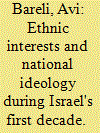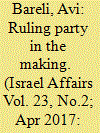|
|
|
Sort Order |
|
|
|
Items / Page
|
|
|
|
|
|
|
| Srl | Item |
| 1 |
ID:
158070


|
|
|
|
|
| Summary/Abstract |
The article offers an empirical foundation through which the electoral behaviour of the new Oriental immigrants into Israel during the 1950s can be interpreted, based on the assumption that their conduct was, in fact, rational. It focuses on the egalitarian wage policy in the important public sector, which led Ben-Gurion and the leaders of Israel's first ruling party, MAPAI, to a confrontation with the European academically educated middle class, and on the political–electoral strategy of MAPAI vis-à-vis the Oriental immigrants during the 1950s electoral campaigns. The article discusses three assumptions: first, that this wage policy was part of the ruling party's attempt to address the interests of the new Oriental working class; second, that this political strategy was publicly discussed, and it addressed the Oriental immigrants’ rational socio-economic calculations for the purpose of securing their political and electoral support; third, that the leaders of nascent Israel and its ruling party presented this policy as a measure towards creating a minimal socio-economic foundation for the process of nation-building during the 1950s.
|
|
|
|
|
|
|
|
|
|
|
|
|
|
|
|
| 2 |
ID:
151814


|
|
|
|
|
| Summary/Abstract |
The article discusses the transformation of Mapai, the main political party in Israel’s pre-state years, into the ruling party of a sovereign state. By way of doing so Mapai went through three distinct stages, from striving to build a working class of rural and urban labourers, to seeking immediate statehood via rapid mass immigration and partition, to acting as an effective ruling party, or the ‘party of the state’ as it called itself, following the November 1947 UN partition resolution. It was in charge of creating the machinery of government during a time of war, and this fostered hierarchical patterns characteristic of a sovereign rule, notably the independence of the government vis-à-vis the political parties, including Mapai itself.
|
|
|
|
|
|
|
|
|
|
|
|
|
|
|
|
|
|
|
|
|